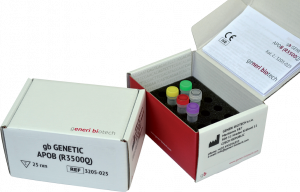gb GENETIC APOB
Detection method:
allelic discrimination
This in vitro diagnostic kit is intended for detection of mutation R3500Q in the gene APOB in human genomic DNA. Detection is based on real-time polymerase chain reaction (qPCR) using fluorescently labelled probes (allelic discrimination).
Clinical implications of the CE IVD kit
Apolipoprotein B100 (APOB100) is one of the B forms of apolipoprotein and it forms the basic protein component of lipoproteins with low and very low density (LDL, VLDL). Thus it plays a significant role during lipid and cholesterol transport. It is synthesized in the liver and distributed by the blood stream to the cells on whose surface it works as a ligand for LDL receptors mediating cholesterol transport to the cells.
The most common APOB gene mutation is an R3500Q mutation, which leads to the exchange of amino acid arginine (Arg) for glutamin (Gln) in position 3527. In such a way it causes a change in the protein structure in the place of the receptor binding. Consequently, there is a lower affinity of LDL particles towards the receptors and their accumulation in blood. This genetic disorder is called a familial defective Apolipoprotein B100 and it is one of the causes of familial hypercholesterolemia. Cholesterol accumulation in blood increases the risk of atherosclerosis and heart attack. Although the frequency of the mutant allele is only 0.1% of the healthy population, the frequency is up to 10% in individuals with familial hypercholesterolemia.
Parameters of the real-time PCR diagnostic kit
- ready-to-use assay
- sample concentration 1-100 ng/µl
- positive and negative controls included
- FAM and HEX channels detection
- identical amplification profile as gb HEMO, gb GENETIC, gb PHARM kits
Validated for:
ABI 7500/7500 Fast (ABI)
ABI 7900HT (ABI)
AriaMx (Agilent Technologies)
CFX96/96Touch (Bio-Rad)
iCycler iQ5 (Bio-Rad)
Light Cycler 480/Cobas z480 (Roche Diagnostics)
MIC (BMS)
QuantStudio 5 (Applied Biosystems)
RG 3000 (Corbett Research)

 gb OneStep RT-qPCR Kit
gb OneStep RT-qPCR Kit 

